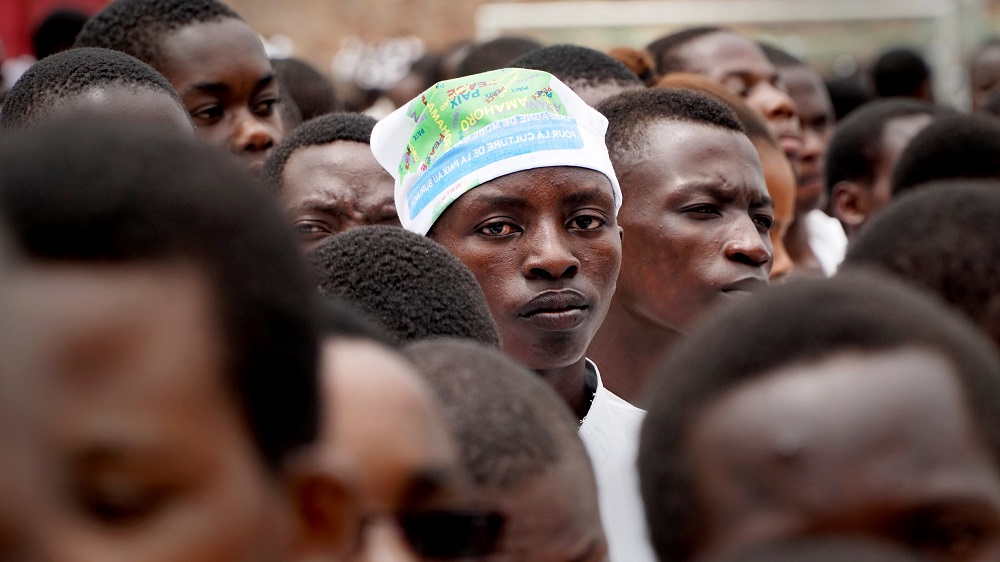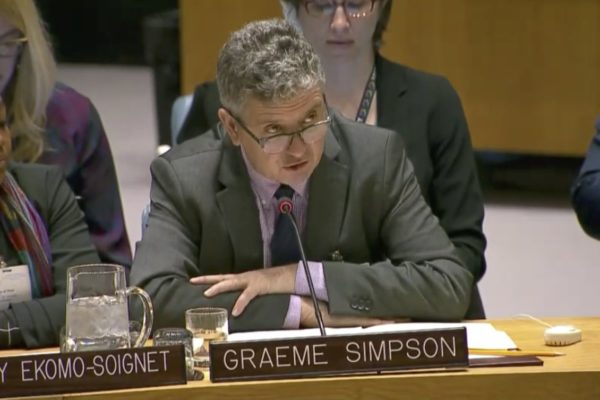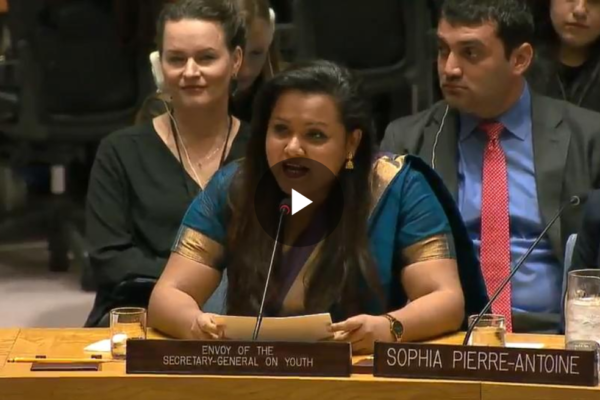Youth at the center of peacebuilding: Director of Interpeace USA presents Progress Study on Youth, Peace and Security to the UNSC

On Monday 23 April, an Open Debate on Youth, Peace and Security was held at the United Nations Security Council, on the eve of the High-level Meeting on Peacebuilding and Sustaining Peace organized by the President of the General Assembly. On this occasion, Graeme Simpson, Director of Interpeace USA, presented the main findings and recommendations of the Progress Study conducted to support the implementation of Resolution 2250 (2015) on Youth, Peace and Security. Mr. Simpson was joined by Jayathma Wickramanayake, the UN Secretary-General’s Envoy on Youth; Sophia Pierre-Antoine, member of the Advisory Council of the World Young Women’s Christian Association and member of the Board of the FRIDA Young Feminist Fund; and by Kessy Ekomo-Soignet, a peacebuilding expert from the Central African Republic.

Graeme Simpson, Director of Interpeace USA and lead author of the Progress Study on Youth Peace and Security at the Open Debate held on April 23, 2018 in the United Nations Security Council.
Interpeace’s contribution to the development of the Progress Study on Youth, Peace and Security
With the support of Interpeace and an Advisory Group of Experts, including 21 scholars, practitioners and young leaders, Graeme Simpson developed a participatory research process aligned with Interpeace’s peacebuilding principles, with an emphasis on giving a voice to young people themselves. Interpeace also contributed to the Progress Study by conducting case studies on Central America (Northern Triangle), Côte d’Ivoire, Palestine, and Sweden. Together with its local partners, Interpeace carried out participatory and inclusive consultations with a broad range of young people across religious, ethnic, socio-economic and geographical divides, to raise awareness of Resolution 2250 (2015) and explore the possibilities for collective action on peace and security.
The Progress Study, entitled “The Missing Peace: Independent Progress Study on Youth, Peace and Security”, was published in March 2018 and provides Member States with concrete recommendations to give youth a greater voice in decision-making and enhance their meaningful participation in peace processes at local, national, regional and international levels. Chief among them is the need to stop addressing young people as “problems to be solved”, but rather as partners to work with towards achieving sustainable peace. The pervasiveness of stereotypes and policy myths about youth not only obstructs young people’s ability to contribute to peace and security, but may actually act as a driver for the minority of young people who do engage in violence
Youth at the center of peacebuilding
This strongly echoes Interpeace’s core principle that inclusion is a prerequisite for more peaceful and just societies. For 24 years, Interpeace has strived to reach beyond limited models of youth participation and put young people at the center of the design and implementation of programmes that address the factors of most consequence to them in their environments. In Mali and Cote d’Ivoire, Interpeace and its local partners collaborated with hundreds of young people in a participatory research project, whose findings challenged preconceived ideas about the causes of youth violence. It highlighted young people’s need to find their place in society, and to be recognised and valued in their communities. In El Salvador, Interpeace supported young women and men in peacefully transforming urban/gang violence, boosting their technical/ entrepreneurship skills and resilience to violent pathways through the development of alternative routes to social belonging and success. In the Great Lakes Region, cross-border youth dialogue groups, including politically-affiliated young people, helped young women and men counter negative stereotyping and manipulation, and fostered their engagement in democratic leadership simulation exercises in preparation for future political participation.
In all these few examples, Interpeace committed to “prioritize support for the positive resilience of the majority of young people, rather than exclusively reacting to the risk represented by just a few”[1]. This shift in attitude and action towards young people is now required at all levels – from multilateral agencies and INGOs, to national governments, local organisations and communities.
Open Debate at the United Nations Security Council
The UN Secretary-General’s Youth Envoy, Ms. Jayathma Wickramanayake, introduced the Progress Study to the Security Council by stating that young people represent “promise – not peril. The complex nature of peacebuilding and conflict prevention requires us to tap into the potential and creativity of young people. Young people should be seen as an asset – not a problem.” She went on to underline that the “The Missing Peace” offers recommendations to support the peacebuilding work of young people, prioritize their political participation, and partner with youth to recognize, fund, and protect their work. Mr. Simpson followed Ms. Wickramanayake statement, by urging Member States and the International community to invest on young people’s resilient commitment to peace: “To do this effectively, it is necessary to move from exclusion to the meaningful inclusion of young people.”
UN representatives from different countries congratulated the organizations and people involved in the development of the participatory research process and echoed their willingness to move forward with the recommendations described in the Progress Study. Ambassador Irina S. Nyoni - Deputy Permanent Representative of Sweden to the United Nations, expressed: "We need to build on young people's knowledge and capacities. Ensuring the political and economic participation of youth is essential in the advancement of peacebuilding processes. Youth should be heard and seen.” Ambassador Mansour Ayyad Al-Otaibi – Permanent Representative of the State of Kuwait to the United Nations, described: “Young people are the central pillar in the development of society. Any government that leaves this work aside is missing a crucial piece. We cannot achieve our ambitions without helping young people. Youth are our greatest investment."
A full version of the Study, including detailed information about the research process and a full reference list, will be published by July 2018.
Read Interpeace’s Contributions to the Progress Study on Youth, Peace and Security:
Case study conducted in Central America (Northern Triangle)
Case study conducted in Côte d’Ivoire
Case study conducted in Palestine
Case study conducted in Sweden
[1] A/72/761-S/2018/86 p.18

